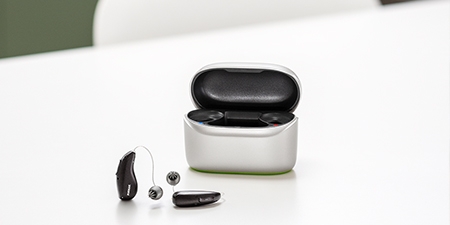Labyrinthitis: Causes, Diagnosis, and Therapies
.webp?branch=web_prod&quality=80&auto=avif&format=webp)
Labyrinthitis: Causes, Diagnosis, and Therapies
10 min
Published June 27, 2024
Demystifying Labyrinthitis – Causes, Diagnosis, & Therapies
Labyrinthitis is an inflammation of the inner ear that can cause dizziness, vertigo, and balance issues. It often appears suddenly and disrupts day-to-day activities, making simple tasks like walking or standing challenging. People affected might experience nausea and occasional headaches.
Thankfully, labyrinthitis is usually a temporary condition and long-term effects are uncommon. Understanding the symptoms and how labyrinthitis is caused can help reduce its impact on your life. Take comfort in knowing treatment options exist to provide relief and encourage recovery. This informative guide from our hearing clinic will cover everything from identifying symptoms to finding effective therapies so you can manage labyrinthitis confidently.
Labyrinthitis, Explained
Labyrinthitis begins with inflammation of the vestibular nerve, which is located deep within the inner ear. Infections in the inner or middle ear usually trigger this inflammation. The vestibular nerve helps send signals to the brain that affect balance and spatial awareness. When these signals are disrupted, balance and bodily control suffer.
The inner ear houses a network of delicate channels, tubes, and sacs filled with fluid. This fluid moves in response to head movements, helping your brain interpret your movement and location. Near the eardrum lies the cochlea, responsible for sending sound wave signals to the brain.
When inflammation occurs in the middle ear, it affects both balance and hearing signals. As a result, one ear might send conflicting signals to the brain compared to the other ear, leading to dizziness and imbalance. Headaches and vertigo – a feeling of moving without actual movement – often accompany labyrinthitis.
The Symptoms of Labyrinthitis
Labyrinthitis typically affects both balance and hearing, making everyday activities more difficult. Balance issues and dizziness are common, along with discomfort and disorientation. While this condition usually resolves in a few weeks, symptoms might persist longer for some. Recognizing the signs early can help in seeking timely treatment from an audiologist or ear specialist to ease discomfort and promote quicker recovery. Common symptoms of labyrinthitis include:
Hearing loss
Pressure and discomfort within the ears
Fluid discharge from the ear
Trouble focusing
Mild headaches
A sensation of floating or lightheadedness
Changes in the way you walk
Blurred vision
Feeling unsteady
Loss of balance
Vertigo
Severe labyrinthitis symptoms can make walking in a straight line difficult. Some people experience issues staying upright or might faint due to the inner ear's role in balance. The symptoms listed above can often induce a fever from the infection and nausea from the spinning sensation. Vomiting, a general feeling of sickness, and tinnitus (ringing in the ears) are also common. When these symptoms occur together, many individuals might also experience labyrinthitis chronic anxiety.
The Root Causes of Labyrinthitis
Viral or bacterial infections are the primary culprits behind labyrinthitis. These infections can originate from the nose, mouth, chest, or upper respiratory regions and spread to the inner ear.
While labyrinthitis itself isn’t contagious, the viruses or bacteria that can cause it are. Adults aged 30-60 are more likely to develop viral labyrinthitis, though anyone can be affected. Men and women face equal risks. Factors like smoking, alcohol consumption, stress, and autoimmune conditions can increase your vulnerability to labyrinthitis.
A Look at the Short- & Long-Term Effects of Labyrinthitis
There is good news. Labyrinthitis usually appears as a single episode, which, though intense, rarely becomes chronic. During the first few days, it can cause severe discomfort and disorientation. Thankfully, most people recover quickly from its initial symptoms, such as dizziness and balance issues, often within days to weeks.
Rest and home care during the early stages can significantly help ease the symptoms. Long-term effects are rare but possible. If left untreated, bacterial labyrinthitis may lead to complications, including permanent hearing loss or damage requiring further medical intervention. Some may experience extended periods of vertigo, but such cases are uncommon.
Seek Medical Attention for Labyrinthitis
If you experience symptoms of labyrinthitis, you should visit an ear doctor promptly. Early evaluation helps determine the exact cause and ensures proper treatment. Multiple conditions can cause labyrinthitis, making accurate diagnosis essential. Symptoms can begin suddenly and may worsen, so timely medical advice is vital.
If your symptoms don't improve in a few days, become more severe, or if new symptoms appear, visit a doctor or audiology center immediately. Rapid hearing loss or severe dizziness warrants urgent attention. You might also need to see an ear, nose, and throat (ENT) specialist for a comprehensive examination. Quick action can lead to better management of symptoms and a faster recovery. Always seek immediate medical care for serious symptoms like double vision, fever, or fainting.
How Labyrinthitis is Treated
Treating labyrinthitis involves several approaches to manage and reduce symptoms. Hearing doctors often prescribe anti-inflammatory drugs and cortisone to alleviate inflammation. Over-the-counter motion-sickness tablets, sedatives, and antihistamines can also bring relief.
Rest is essential, but incorporating specific exercises and physical therapy can speed up recovery. These exercises focus on improving eye movement, coordination, and balance. A physiotherapist can guide you through these activities, ensuring they are safe and effective. Most people see significant improvements within one to six weeks, with full recovery often occurring within two months.
Tips for Managing Labyrinthitis
Here are some practical tips to help reduce the impact labyrinthitis has on your daily life:
Avoid rapid head movements to reduce dizziness.
Focus on stable, non-moving objects to prevent disorientation.
Minimize exposure to bright lights and loud noises.
Avoid environments with flickering lights, such as televisions.
Steer clear of heights and ladders to prevent balance issues.
Sit or lie down, close your eyes, and stay still if you feel unsteady.
Refrain from driving and using heavy machinery.
Clear floors of potential tripping hazards and slip-proof bathroom surfaces.
Rest in a dark room with closed eyes if dizziness occurs.
Stay hydrated and get adequate rest, as fatigue can exacerbate symptoms.
Avoid alcohol, as it can worsen dizziness and balance problems.
Avoid air travel due to potential discomfort from pressure changes.
Begin walking as soon as you feel comfortable, but start slowly and with support.
Carry sunglasses to mitigate light sensitivity.
There Is a Road to Recovery from Labyrinthitis
Labyrinthitis, though challenging, is usually temporary and manageable. Seek timely medical advice and follow recommended treatments to ease your symptoms. Stay positive and patient throughout your recovery. With the proper care and proactive precautions, you'll soon regain full balance and hearing health.




